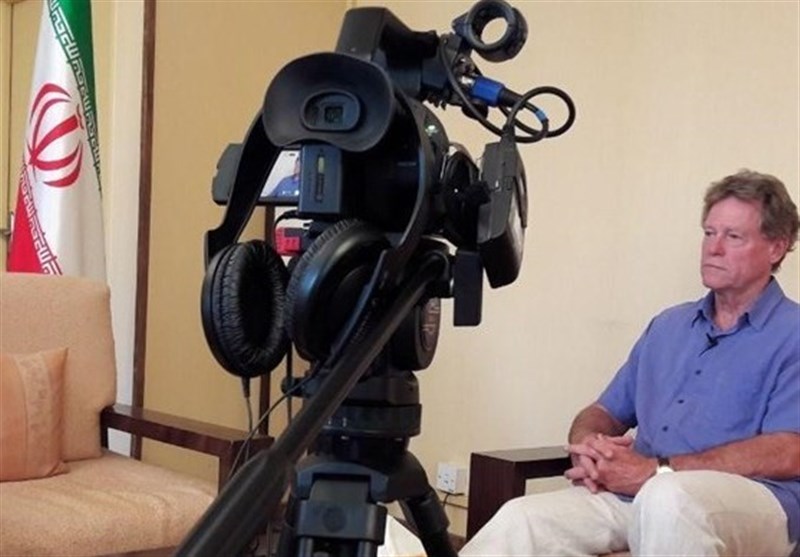Trump Not to Take Any Meaningful Action against Riyadh over Khashoggi: US Prof.

"…President Trump has already signaled he is unwilling to take any meaningful
action against the Saudi regime,” Beau Grosscup, California State University
Professor Emeritus of Political Science, told Tasnim.
He added, "As in the past, allies of the US are immune to being held to account
on human rights abuses except in a rhetorical sense. Only the designated
'enemies of the US (currently Iran, Venezuela, Syria) are to be held to
account.”
Following is the full text of the interview:
Tasnim: As you know, Jamal Khashoggi entered the Saudi consulate in Istanbul on
Oct. 2 to get documents for his forthcoming marriage. Saudi officials say he
left shortly afterwards but Turkish officials and his fiancée, who was waiting
outside, said he never came out. What do you think?
Grosscup: It has been pretty well established that Mr. Khashoggi did not come
out of the consulate office, especially since with an impending marriage, there
would be no reason for him to be/stay in hiding.
Tasnim: Turkish sources have said the initial assessment of the police was that
Khashoggi, an outspoken critic of the Saudi government, had been deliberately
killed inside the consulate. Riyadh has dismissed the claims. Could you possibly
say what motive Riyadh had for this?
Grosscup: Mr. Khashoggi is/was regarded as an outstanding journalist, with
strong family ties to the Saudi royal family in the past. But, as a major player
in the Saudi 'progressive' media, once in exile he had become a fierce critic of
the new Saudi regime under Mohammad bin Salman, charging that repression in
Saudi Arabia is worse than ever. I suspect the Crown Prince's motive was to make
clear to all dissidents and would be dissidents that his reach is global and the
punishment severe as there has been little effort, other than public denials, to
cover the assassination event. I see it as a clear warning to critics of the new
leader and his 'reforms', especially his recent 'purges' against the old guard,
that young though he may be, he is in charge, and having been lauded by
President Trump, (and to some extent Israeli leadership), he feels he has a
'green light' to do whatever he pleases with only mild symbolic criticism. He
knows the real focus of US-Saudi-Israeli unity is regime change in Iran and that
neither the Trump administration nor Israel will do anything to undermine that
unity and its goal, especially the assassination of a 'fake news' Washington
Post journalist.
Tasnim: US President Donald Trump threatened "severe punishment” for Riyadh if
it turned out Khashoggi was killed in the Saudi consulate in Istanbul. Do you
believe Trump will take any action against Riyadh taking into account
Washington’s arms deals with Riyadh?
Grosscup: President Trump has already signaled he is unwilling to take any
meaningful action against the Saudi regime. He has showered the new Crown Prince
with high praise, has an important business relationship with past Saudi regimes
(as he himself has publicly noted), and has made clear he admires the autocratic
rulers around the world, openly wishing he had their power and was able to adopt
their methods of governing. I suspect, even with a confirmation of the
assassination, Trump will basically say to the Saudis, "please don't do this
again" and focus the world's attention on 'more important tasks' requiring a
strong US-Saudi relationship. Trump will find a way to push this 'unfortunate
event' into the background and move on.
Tasnim: When do you think the world would smell the coffee and stand up to Saudi
human rights violations?
Grosscup: Since the US 'owns' (dominates/enforces) the global human rights
discourse and policy, there is no reason to expect any movement against Saudi
Arabia for their human rights violations. As in the past, allies of the US are
immune to being held to account on human rights abuses except in a rhetorical
sense. Only the designated 'enemies of the US (currently Iran, Venezuela, Syria)
are to be held to account. It is the reason the Trump administration recently
withdrew from the UN Human Rights Council, to make the point that it is the US
who determines human rights policy, not the UN or any other agent.
Source: TasnimNews
















